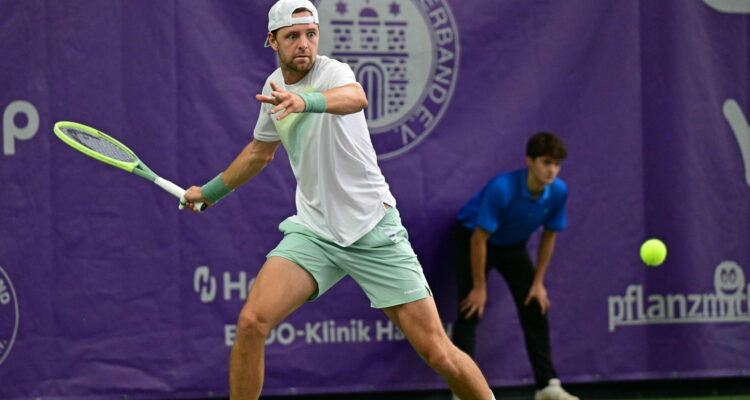HAMBURG, October 19, 2023
Maximilian Neuchrist has been on the Pro-Circuit for over a decade, accumulating a wealth of experiences along the way. However, it’s in this season that the 32-year-old Austrian is playing his best tennis yet, breaking into the Top 200 of the ATP rankings for the first time in April.
The Viennese native has clinched 13 singles titles on the ITF Pro Circuit, including victories in some of the more exotic locations in the tennis world, such as Cambodia, Senegal, and Nigeria. Last year, he reached his first ATP Challenger final in Maia, Portugal, where he finished runner-up to French youngster Luca van Assche in three sets.
At this week’s Hamburg Ladies & Gents Cup, the World No. 260 is making another attempt. After his first-round victory over Moez Echargui from Tunisia, we caught up with him for an interview.
Tennis TourTalk: Maximilian, you’ve just come from tournaments in sunny Spain. How challenging was it for you to get used to indoor tennis in Hamburg?
Maxilian Neuchrist: Adapting to new conditions isn’t one of my strengths. When I know it’s going to indoor courts, I try to focus specifically on my serve in the weeks leading up. That’s the key, especially on rough days. If the serve works well, it can at least carry me into a tie-break, and I’m definitely in the mix.
You’ve had a great season overall, but in recent weeks, things haven’t been going as smoothly, and you’ve faced some early-round losses. Have you been able to identify a reason for that?
I started the season strong. But due to commitments with the leagues, I got caught in a whirlwind. Additionally, I was dealing with a shoulder injury. However, the three Grand Slam tournaments were on the horizon, and I knew I couldn’t afford to miss those in my situation. So, substantial practice over the summer wasn’t really possible, and I particularly let my forehand and serve quality slip. That created a bit of a hole. I always try to play the best tournaments I can get into, which means facing really tough opponents. If my forehand and serve aren’t working, I can’t beat players ranked between 100 and 200.
What do you mean exactly when you say you couldn’t afford to miss the Grand Slam tournaments in your situation?
It’s about the prize money. I rely on it with my ranking.
Is this also a reason for participating in a lot of league matches?
Yes, I play in five countries (laughs). At the start of the season, you commit to league play. These matches are often very helpful. But this year, it didn’t quite align with my schedule. However, you’re compensated well financially. It’s about finding the right balance.
At 32, you’re having the best season of your career. Would you consider yourself a late bloomer?
I understood many things later, such as how to analyze opponents and assess what tools I need to beat them. Unfortunately, injuries have also been a constant companion in my life. In 2018, I was doing really well and had qualified for the Grand Slam tournaments. Then I ruptured my Achilles tendon. That was a turning point. Something like that can turn you into a retiree overnight.
How are you physically today?
At a certain age, there are occasional aches and pains, but overall, I feel fit. Plus, you learn to deal with it. It’s part of the profession.
As a tennis pro, you end many tournament weeks with a loss. Is that also part of the learning process?
You just need to be eager again the next week and build up a will to win. Losing shouldn’t become a habit; it should always give you new motivation. Losses should build you up.
You’ve also participated in some tournaments in more exotic countries on the circuit. Did you have any special experiences there?
I played in Kuwait and in Abuja, Nigeria, for example. These tournaments were very good. But there were also Futures in Lagos that were quite chaotic. This year, I played Challenger events in India, where I ended up in the emergency room due to food poisoning.
What are your goals for the rest of the season?
I’ll need to achieve a few good results in my last five or six tournaments because I still have some points to defend. The goal is always to get into the Grand Slam tournaments. In the qualifiers, you face many players who are also on the Challenger Tour. It’s no secret that big money is in Grand Slam tournaments, and as a pro, you need to earn that to make a living from your work.
If you could choose, which main draw of a Major would you prefer to play?
(Pauses) Australia. I’ve never played there. Plus, it’s said to be spectacular with the fans.
When you’re traveling, do you explore the places as well?
Nowadays, I tend to explore the cities more and try to experience some local things. It’s truly a privilege as an athlete to travel around the world. Many friends envy me for that and tell me to keep playing until my foot falls off. When you’re aware of that, you can enjoy it more.
Any plans for going out in Hamburg?
I know the city quite well because I used to play for TTK Sachsenwald. The area around the Alster is very beautiful, but the weather also needs to cooperate. I’ve just come from Spain and didn’t bring any warm clothing. Initially, the plan was to fly home first, but coming directly to Hamburg was the less expensive option.
Interviewer: Thank you and best of luck.
Interview: Florian Heer







